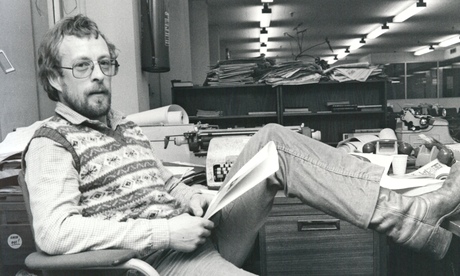
Pugnacious and anarchic, the former Guardian journalist Peter Chippindale, who has died aged 69 of kidney failure, assured his reputation with one savagely funny book – Stick It Up Your Punter! This was a history of Rupert Murdoch's Sun newspaper, co-written with Chris Horrie. Peter rose exuberantly to the challenge of pinning down the leering, jeering, bully-boy editor Kelvin MacKenzie. The book's title came from "Stick it up your Junta!", one of MacKenzie's notorious "anti-Argie" headlines during the Falklands war. The other was "Gotcha!", when the cruiser Belgrano was torpedoed. Stick It Up Your Punter!, published in 1990, was a classic exposure of the paper's prurience and noisy cynicism. The book deservedly remains high on media studies reading lists.
Peter and I first worked together on the Guardian in 1979 on the Jeremy Thorpe case. In an atmosphere of black farce, the then Liberal party leader was accused of ineptly conspiring to murder his former male lover, but succeeding only in having his dog, a Great Dane called Rinka, shot. Some Guardian bosses were uneasy at what they feared was an anti-gay, anti-Liberal witch-hunt. But Chip's truculence proved its journalistic worth. After Thorpe's eventual acquittal, a juror revealed to us that the jury had crucially objected to the chief prosecution witness being offered £50,000 for his story by the Telegraph if Thorpe was convicted – but only £25,000 if he got off.
The Guardian declined to print this. Bruce Page of the New Statesman was braver and did so. The authors were duly hauled up before the lord chief justice, John Widgery. To our delight, he agreed with us that it was not in fact illegal to publish such information, despite common opinion. Widgery asserted that we were "reputable and experienced journalists". However, the government passed a law against anyone ever repeating what Chip and I had done.
The Chippindales are a Yorkshire family. Peter was, however, born in northern India, an outpost of empire. His father, Keith, was stationed at Dehradun, as a captain in the 11th Sikh regiment. After Indian independence in 1947, the family returned to the Leeds area, where Keith worked in insurance and Peter's mother, Ruth, practised as a GP.
Like his two brothers, Peter was sent to Sedbergh, the boys' public school known for its rugby, and for cross-country runs over the freezing Cumbrian fells. After a history degree at Reading, and an adventurous hike on the hippy trail to Afghanistan (where he contracted a bad case of hepatitis), Peter fell into journalism in 1970 more or less by accident, working for John Pick's press agency in York. He was exhilarated by the immediacy and the salesmanship: "The very next day, there it was," he would say, "in print, in a paper!"
He worked the beat with Don McPhee, a talented photojournalist soon snapped up by the Guardian. Peter followed him to Manchester, hired by the Guardian's northern news editor, Harry Whewell. He was dispatched to Belfast at the height of the troubles, to report from the much-bombed Europa hotel. It was more high-adrenaline work, and won him a transfer to London.
There Peter joined a gifted and sometimes raffish crew. They included Peter Cole, Lindsay Mackie, Nick de Jongh, Peter Hillmore and Martin Walker. The news editor Jean Stead was an early admirer: "One of the best news reporters we ever had," she writes. "I can see him now, small but standing confidently in front of the news desk, setting out his take on a story." He was indeed full of confidence. Peter was memorable among his friends for his phrase: "What none of you seem to realise is …"
His first book, Juntas United (1978), written with Ed Harriman, was an encyclopedia of the world's dictators. He and I then co-wrote The Thorpe Committal (1979), which broke taboos by publishing all the prosecution evidence given at a local hearing, in advance of Thorpe's Old Bailey trial. Peter next wrote a book on Citizens Band radio, The British CB Book (1981), listing (and sometimes shamelessly inventing) colourful truck-driver slang.
In 1981, he moved to LWT's The London Programme and then to the short-lived leftist News on Sunday. When it collapsed, he wrote Disaster! (1988) with Horrie, a fellow ex-employee. It was a withering account of the "right-ons" who had proved they could not run a paper. Its success led to Stick It Up Your Punter! and then to Dished! (1991), a similarly abrasive saga, co-written with Suzanne Franks, of the failure of British Satellite Broadcasting (BSB).
A satire, British Monarchy Plc: An Offer for Sale by Tender (1988), was followed by Life As Sutch (1991) about the founder of the Monster Raving Loony Party. Peter was less successful when he moved to Cornwall and took up fiction-writing, although Mink! (1995) his anti-Thatcherite animal fable, had a following in Germany. His later years were clouded by increasing physical and mental ill-health.
Peter was twice divorced. He is survived by two daughters, Lucy and Chloe, from his first marriage, to Sally Crawford, and a daughter, Anna, from his second, to Susan Hooper.
• Peter Chippindale, journalist and author, born 4 July 1945; died 10 August 2014

